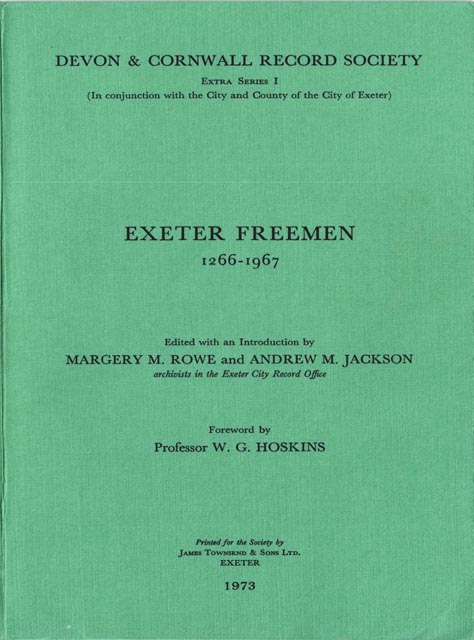Introduction
Published online by Cambridge University Press: 05 August 2023
Summary
THE EARLY HISTORY OF THE FREEDOM
In Exeter as in other towns the origin of the body of freemen is lost in obscurity. The eleventh-century Anglo-Saxon gild which existed in Exeter, appears to have been social and religious in purpose, and to have been unconnected with the economic life of the city. However, the wording of the earliest charter to the city whose text survives, that granted by Henry II, implies an earlier grant of commercial privileges by Henry I, which can only have been purchased by an organised group of townsmen. These may well have proceeded to restrict the privileges so acquired to themselves and their heirs, and to others whom they were prepared to admit to the circle, normally on payment of a fine. This would account for what were apparently the only two ways in which the freedom could be acquired in the thirteenth century, hereditary succession or purchase. However the freedom has a constitutional, as well as an economic aspect. In the twelfth century and later, charters occur with references to the citizens (cives) of Exeter, and certainly in the fourteenth century this term was synonymous with freemen. Other references define the citizens as those who kept the city court, as for example a manumission of 1143, which confirms an agreement made ‘in hundred civium exonie.’ The process by which these two aspects of the freedom, the economic and the constitutional, became united cannot be established in any detail.
From the 1160s onwards there are references to a Guildhall, almost certainly standing on its present site in High Street, and this evidence of a merchant gild is confirmed by two deeds which refer to the stewards of the gild. From the earlier of these, dated 1189, it appears that the gild officers were responsible for the income derived by the city from its manor of Duryard, outside the walls to the north and west. A still earlier grant by the citizens about 1141 refers to Theobald son of Reiner, ‘our steward’ (dapifer), also in connection with Duryard, and the title of this official indicates that he was probably an officer of the gild.
- Type
- Chapter
- Information
- Exeter Freemen 1266-1967 , pp. xi - xxxviPublisher: Boydell & BrewerFirst published in: 2023

